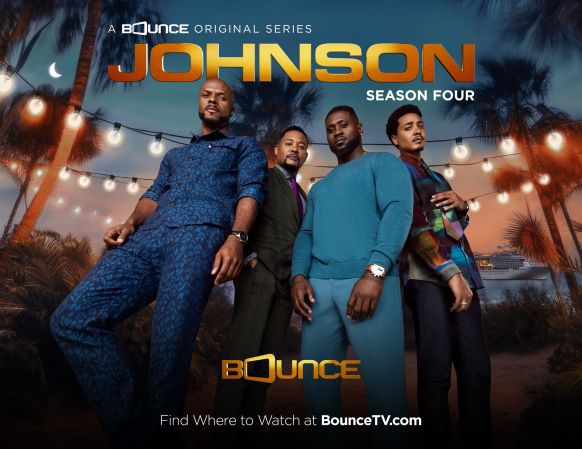
Source: Provided by Bounce TV / Bounce TV Network
In an exclusive discussion with MadameNoire, the all-Black male leads of Johnson —Deji LaRay, Thomas Q. Jones, Phillip Smithey, and Derrex Brady—share their hopes for Season 4 of the hit Bounce TV series. Opening up about vulnerability, mental health, and the power of brotherhood, they explore the deeper connections their characters represent. The actors reflect on the importance of showing Black men as multi-dimensional—navigating love, success, and life’s challenges. As they dig into the real-life inspirations behind their roles, the conversation highlights the show’s impact in breaking down barriers and celebrating authentic Black male experiences.
Season 4 of the hit show airs new episodes on Bounce TV at 8pm EST /7pm c every Saturday. Seasons 1 – 3 are available to stream on Hulu.
MadameNoire: Congratulations on reaching your fourth season of Johnson. Deji, as one of the creators, give us an overview of the show and what we can expect in this current season?
Deji: It’s been an incredible journey. This concept actually started back in 2014 when I wrote the original pilot. I noticed there was a lack of authentic representation of Black men on TV—men who reminded me of myself, my friends, and my family. I wanted to offer an alternative to what I was seeing on screen, so I wrote the pilot, but it sat on the back burner for about three years.
That changed when I met Thomas Q. Jones in 2017. He connected with the material, and initially, I approached him to act in the project. I was trying to put together an independent pilot to pitch to networks, and I needed actors. But Thomas didn’t want to just act; he wanted to be a producer. He wanted to help shape the narrative, and we partnered up. He invested in the original pilot, and we brought on Derrex and Philip, two guys I had worked with before. They embodied the essence of what I wanted to see on screen. Not only were they great actors, but in their real lives, they reflected the diversity and richness of Black male experiences. That authenticity is key to the show’s success.
Symbolically, all the characters share the last name Johnson, which is the most common African American surname in the U.S. This is a metaphor for the shared experiences of Black men, but the characters aren’t related. Each has his own perspective and journey, yet they are connected through their Blackness. Now, four seasons in, it’s rare to see a show like Johnson —authentic, honest, and enduring.
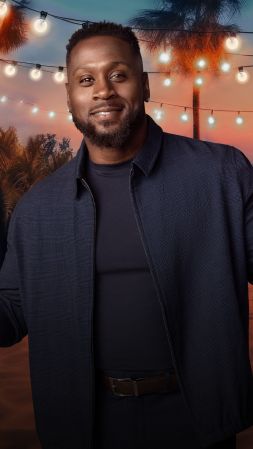 Source: Thomas Q. Jones (Photo Credit: Bounce TV) / Bounce TV Network
Source: Thomas Q. Jones (Photo Credit: Bounce TV) / Bounce TV NetworkThomas, let’s talk about your experience with getting involved and how you shaped your character?
Thomas Q. Jones: When I met Deji in 2017, the timing was perfect for me to put on my producer hat. I had been acting for about three years and was fortunate to land some incredible projects. But as an actor, you often hear “no,” whether it’s in auditions or funding. When Deji approached me, it felt like a no-brainer. I connected deeply with the material. As a Black man in the industry, I felt a responsibility to contribute beyond acting—to help bring positive portrayals of Black men to the screen.
We shot the pilot together, and I immediately connected with Derrex and Philip. We became brothers, not just co-stars. The chemistry you see on screen is real, and that’s a rare thing. We were aligned from the start in wanting to create a show that defied the usual one-dimensional portrayals of Black men—showing us as more than just stereotypes. Deji is an incredible writer and visionary, and it’s been a blessing to work alongside him for four seasons.
Derrex, your character, Jarvis, is one of the more affluent characters on the show, running a successful real estate brokerage. Tell us more about your character.
Derrex Brady: I love playing Jarvis. Deji created such a multi-dimensional character. On TV, we often see Black men portrayed monolithically, but Jarvis is different. He’s articulate, successful, and yet, he struggles with microaggressions and societal pressures. In season one, Jarvis was very much about protecting his image—being safe. He didn’t want to rock the boat, but as the seasons progressed, his experiences, like the police brutality storyline and learning about his family secrets, shifted his perspective.
By season four, Jarvis is more confident in who he is. He’s no longer just playing it safe—he’s speaking his truth, even if it means ruffling feathers. I love that growth, and I think it’s reflective of the complexity of Black men in America. It’s not just about success; it’s about owning your voice and your identity.
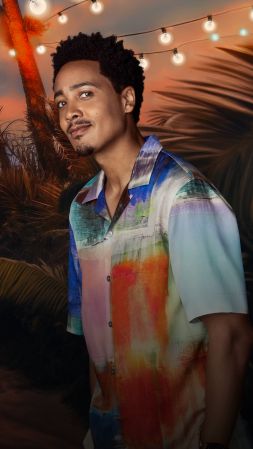
Source: Phillip Smithey (photo Provided by Bounce TV) / Bounce TV Network
Phillip, your character Keith grapples with issues of identity and belonging. How do you prepare for those emotionally charged scenes, and what do you hope to convey through Keith’s journey?
Phillip A. Smithey: Keith represents someone who doesn’t fit the typical mold. He’s quirky, doesn’t fit into all the cultural stereotypes people often associate with Black men, and struggles with feeling like he belongs. Preparing for Keith was about reflecting on my own experiences—how I’ve often felt like I didn’t fully fit in, even within my own community.
Keith’s journey is about learning to embrace who he is, outside of societal expectations. I think that’s something a lot of people, especially Black people, can relate to—the duality of being one way around your community and another way around the majority. I’m grateful for the opportunity to showcase that complexity.
Deji, how has the dynamic between all four characters changed in season four, especially considering their different paths?
Deji: The trajectory of the show is centered around Black men who are best friends. In season one, they hit some roadblocks in their friendship, kind of going in different directions, but they had to overcome those obstacles. In season four, they’re learning each other more based on their experiences. They’re there for each other through thick and thin, holding each other accountable. Each character is growing individually, but they’re also accepting each other more as they evolve.
In season one, the relationships were more about specific dynamics—like Greg with Jarvis or Keith with Omar. But now, the world is bigger in season four, and the guys are dealing with more challenges, but they’re still there for one another. The Brotherhood remains strong, even though their relationships grow, change, and develop. What people love about the show is that through it all, the love and support for one another is always there.
Thomas, your character Omar voluntarily goes to therapy. That’s important because it highlights that it’s okay for strong, professional and successful Black men to seek professional help. How does Johnson contribute to this conversation of mental health for Black men?
Thomas Q. Jones: It’s a huge conversation, and it needs to be trending in our community. As Black people, we’ve been traumatized for centuries, and that’s a direct hit to mental health. Everything starts with mental health. If your mind’s not right, everything else falls apart. This show is specific to our narrative, and it allows us to showcase scenarios that reflect Black men’s real lives.
Omar’s character goes through a lot—marital issues, a custody battle, struggles as a Black entrepreneur, and dealing with being stereotyped as a dark-skinned, muscular Black man with tattoos. He’s misunderstood, and that weighs on his mental health. Black men often don’t have a safe space to express vulnerability because it’s seen as a weakness. But in reality, not expressing yourself hurts you and the people around you.
Omar going to therapy and working through his past trauma shows Black men that it’s okay to seek help. I get messages from people all the time who appreciate my character’s journey. It’s a real reflection of what a lot of Black men go through, and Johnson gives courage to Black men to confront their own challenges.
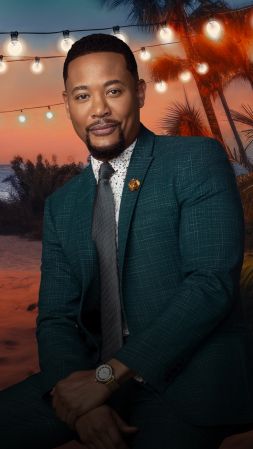
Source: Derrex Brady (photo Provided by Bounce TV) / Bounce TV Network
Derrex, what do you believe are some of the barriers Black men face in discussing mental health openly, and how can media representation like your character help break down those barriers?
Derrex Brady: I think in media, Black men are often depicted as broken if they seek mental health help, instead of just being wounded. What’s powerful about our show is that it normalizes taking care of your health, both mental and emotional.
We also show how Black men can have conflicts and work to resolve them. That’s rare on TV. In season three, we see Omar struggling with the idea of therapy, and Jarvis tells him, “If you go, I’ll go too.” That kind of vulnerability and support is something I’ve never seen on television before. It’s a great example for other Black men, showing them that it’s okay to heal, to be courageous about your health, and to lean on your brothers.
Phillip, your character Keith is emotionally evolving throughout the seasons. In season four, we see you getting married. In your opinion, what role does vulnerability play in building healthy relationships, and how does Johnson showcase both the challenges and benefits of being emotionally receptive?
Phillip Smithey: What’s amazing about Keith is that he says what he’s feeling and thinking, which is something Black men have historically not been allowed to do. We’re seeing a shift now, where mental health is finally being talked about in the common space.
Keith’s willingness to express his feelings—whether in a conflict or otherwise—is an example of how addressing your emotions leads to healthier relationships. The show highlights that Black men don’t have to be tough and silent all the time. Vulnerability doesn’t make you weak; it actually strengthens you. Keith’s character is a testament to the power of saying what’s on your mind and resolving issues with the people you care about.
Deji, what role do you think vulnerability plays in building healthy relationships, and how does *Johnson* reflect both the challenges and benefits of being emotionally receptive?
Deji: Vulnerability is essential. The only way someone can understand your needs in a relationship is if you open up emotionally. The show does a great job of exploring that, especially with different perspectives. My character, Greg, doesn’t believe in therapy; he thinks it’s a trend, and there are people out there who share that view.
But the show is not preachy—it offers multiple perspectives. Emotional expression can take many forms, whether it’s talking to a therapist or confiding in a friend. Over the four seasons, the characters have become more emotionally intelligent, which is significant because Black men are often stereotyped as being emotionless or unable to handle emotions.
On Johnson, we’re showing Black men who can have conflict, resolve it maturely, and be in touch with their emotions. That’s a narrative people appreciate because it challenges harmful stereotypes and shows a more nuanced reality.
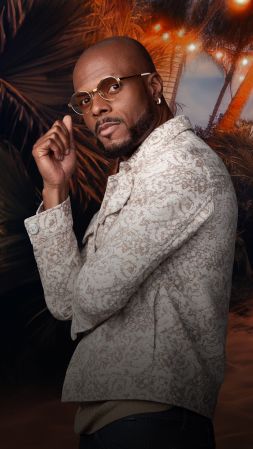
Source: Deji LaRae (Photo Credit: Bounce TV) / Bounce TV Network
Deji, can you also share any personal insights or experiences on how Black men can better support each other in discussing mental health and vulnerabilities in their lives?
Deji: It’s interesting because I’ve noticed that Black men don’t always make the time to connect with each other. Black women often have brunches, travel together, and make space for self-care, but Black men, we tend to focus on work and responsibilities.
For me, I have great friends I see maybe once every six months. But we do express our feelings to each other—we tell each other “I love you.” And I think that’s important. Even if we don’t have regular meetups, just telling each other what we mean to one another makes a difference.
Phillip Smithey: I have a friend who calls me every few months just to check in, and I’m always so moved by that. It’s an example I want to follow. We need to make checking in with each other a regular part of our lives—it could be as simple as a quick call or message. It doesn’t take much, but it can make a big difference.
Derrex Brady: These guys are like the brothers I never had. We tell each other we love each other, and there’s no weirdness about it. We trust each other’s advice, and that trust is important. I hope that other Black men watching our show see that and want to build that same kind of brotherhood. What you see on screen—the chemistry, the love, the trust—that’s real.
It has been such a pleasure speaking with all of you. In wrapping up, what has been the most rewarding part of being part of this cast, both professionally and personally? Phillip, let’s start with you.
Phillip Smithey: I think my favorite thing about being part of this cast is that Johnson is a project that every one of my family members, and every one of my wife’s family members, loves and is proud to see. It’s rare to have a project where the people around you understand how valuable it is to the community. Johnson is one of those shows.
Derrex Brady: For me, it’s in line with Phillip. It’s the first time I feel like I’ve been part of something that’s truly impacting the culture. I love that this show is “for us, by us”, and turns up the volume for audiences. I’m so proud to be part of Johnson. I don’t have to worry about who’s watching—it’s for everyone. That’s the most rewarding part for me.
Thomas Q. Jones: For me, it’s about the friendships I’ve made with Derrex, Phillip, and Deji. Coming from football, it’s a totally different space, skill set, and mindset. But this journey has been more about life. After football, I didn’t have that locker room camaraderie anymore, but with this cast, we’ve built something I’ve never seen on TV—a show dedicated to positive Black male representation. That’s rare. To be part of a project that educates and enlightens not just Black men and women, but people in general, makes me incredibly proud. I think this show is timeless and will stand the test of time.
Deji LaRay: Professionally, everything the guys said is true. We’re breaking stereotypes and showing a balance on TV that’s rare. I’m proud that we’re showcasing Black love in a way that’s rarely seen. This show is a love letter to the culture, to Black men and Black women. I believe Johnson will stand the test of time. On a personal level, what really satisfies me is providing opportunities—whether it’s for actors or behind-the-scenes roles for young Black men and women. It’s not just about what’s on screen, but creating opportunities off-screen as well.
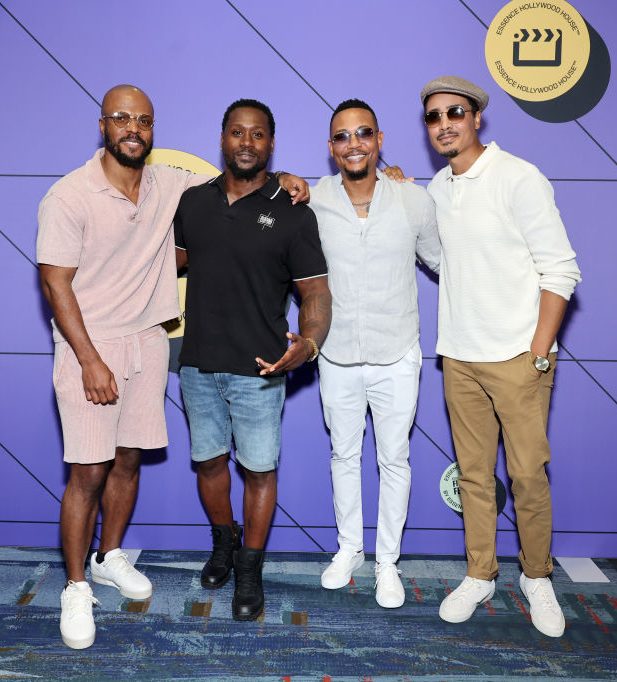
(L-R) Deji LaRay, Thomas Q. Jones, Derrex Brady and Philip Smithey speak onstage during the 2024 ESSENCE Festival Of Culture™ Presented By Coca-Cola® at Ernest N. Morial Convention Center on July 06, 2024 in New Orleans, Louisiana. Source: Cindy Ord / Getty
Last question: What are your hopes for future seasons of Johnson outside of the current themes of vulnerability, microaggressions, therapy, and mental health.
Deji: I want to see all the men find what they’re searching for. I think that would be the ultimate conclusion to this series. In real life, we’re always moving forward, progressing, and searching for what we need. On this show, the men need love. I’d love to see all of them in loving, functional relationships. I’d love to see them passionate about something and successful in what they’re doing. Of course, there will still be obstacles and flaws to overcome, but when it comes to those larger themes we’re all searching for, I hope they accomplish that in future seasons.
Thomas Q. Jones: I would love to see these guys continue to evolve and be seen as human. Black men aren’t always portrayed as human in the media. Sometimes our truth is misunderstood, and that’s partly due to how we convey it. This leads to people not seeing us as fully human, compared to other cultures. I’m big on showing Black humanity. I know a lot of good Black men, and the ones I see in the media don’t reflect the men I know. I’m proud of these characters, and in future seasons, I’d love to see them continue evolving, especially in how people perceive them.
Phillip Smithey: I want to see them win. If Greg wants to be a chef, I want to see him opening a Michelin-star restaurant. If Omar’s starting his business, I want to see him going head-to-head with Apple. If Keith’s running for Congress, I want to see him aiming for president. I want them to achieve their goals, have happy, fulfilling lives with beautiful families, and confidently face their next big challenge. When they go for something, I want to see them accomplish it.
Derrex Brady: I think Johnson has done a great job of showing examples, and I’d love to see these men continue to grow, be successful, and work together in different areas of life. Other cultures often collaborate, but in our culture, we sometimes go our own way. I’d love to see more collaboration. We’ve seen a glimpse of it—like Omar’s tech business, how that could impact Jarvis’s real estate company, Greg’s catering, or Keith’s city council work. I want to see them working together, making money together, and influencing each other. And in relationships, I want to see them figure out how to not bring past baggage into new relationships and how to build trust.
Thank you all for an educational, enlightening and entertaining discussion. Deji, as one half of the show’s creator’s, please give us your final thoughts.
Deji: People say they want to see something different, change the narrative, or have a new perspective on characters. We’re offering that. We have a responsibility as creators to produce this content, and platforms like MadameNoire help tell the story and make the audience aware that it exists. We appreciate your platform for allowing us to have this conversation. Far too often, the narratives that get attention aren’t the ones that paint us in the best light. This conversation was honest and needed. Thank you.
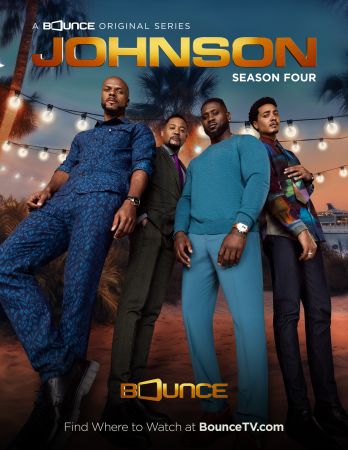
Source: Provided by Bounce TV / Bounce TV Network
RELATED CONTENT: “It’s Will’s Show”: Geoffrey From The Fresh Prince On The Talk He Had With Janet Hubert Before She Was Fired


